21 Jan 2019 | Non categorizzato
Today, the 22nd January, the Focolare Movement recalls Chiara Lubich’s birth on this day in 1920. As usual, the date falls within the Week of Prayer for Christian Unity and is an opportunity to remind ourselves of the Focolare founder’s passion for unity. Below is the text of an “ecumenical prayer” for unity read by Chiara Lubich in Augsburg, Germany in 1998. If we Christians take a fresh look at our 2,000 year history, and in particular at the history of the second millennium, we cannot help but be saddened to see that there has often been a series of conflicts, of quarrels and of mutual incomprehension. Certainly it was because of circumstances: historical, cultural, political, geographical, social circumstances. But it was also because among Christians there was a lack of what should be one of their specific unifying features: love. (…) But, if God loves us, we cannot remain inactive before such divine goodness. As true children we must return his love also as Churches. With the passing of time each Church has, to a degree, become set in its ways, because of waves of indifference, lack of understanding and even of mutual hatred. What is needed in each Church is a supplement of love. So we need love for the other Churches, and mutual love between Churches. The love that leads each Church to be a gift for the others, so that we can foresee in the Church of the future that there will be just one truth, but that it will be expressed in different ways, seen from different angles, made more beautiful by the variety of interpretations. Mutual love, however, is truly evangelical, and therefore valid, only if it is practiced in the measure wanted by Jesus: He said: “Love one another as I have loved you. There is no greater love than this, that a man should lay down his life for his friends” (Jn 15:13) (…) I know, also from experience, that if we all live in this way, there will be exceptional fruits. There will be one effect above all. By living together these different aspects of our Christianity, we will realize that we form, so to speak, one Christian people that can be a leaven to help bring full communion among the Churches. It will be the living out of another dialogue, in addition to the dialogues of charity, of prayer and the theological one. It will be the dialogue of life, the dialogue of the people of God. It is a dialogue that is more than ever urgent and necessary given that, as history shows, little can be achieved in the ecumenical field without the involvement of the people. It is a dialogue which will enable us to discover more clearly, and more effectively, the rich heritage already shared by Christians, including Baptism, Sacred Scripture, the first Councils, the Fathers of the Church. We are eager to see this people and already, here and there, we can see glimpses of it, and we are confident that it will be seen here too. (Chiara Lubich, Augsburg-Germnay, 29 November 1998) Fonte: Centro Chiara Lubich
18 Jan 2019 | Non categorizzato
Alejo from the Focolare community in La Colmena, Paraguay, uses music to communicate his passion for the ideal of fraternity. Alejo Rolon explains that in the Guarani language, “japay” means “wake up!” Alejo lives in La Colmena, a city in the state of Paraguari, about 130 kms from Asuncion, the capital of Paraguay, in the heart of Latin America. He teaches music in a very prestigious college in the city. Several years ago, he began an interesting initiative and has worked with over a hundred young people in staging a series of pop concerts. Using music and words, these concerts have conveyed an invitation to build a more united and stable society. Guarani is an ancient language and is spoken mainly in Paraguay. In 2011, after a complex legal process that lasted over ten years, Guarani and Spanish were recognised as the official languages of the country. Alejo says that “japay, wake up” are words that symbolise the attitude we should have towards life. His aim is to make everyone and especially young people more aware that we must all wake up and take initiative because the change we hope to see in our towns and cities begins with us. He says, “If we keep this in mind, everything we do, even small actions, can be the basis of a new way of life. This is Japay’s challenge.” During a very difficult period for this South American country that is grappling with the changes needed to overcome widespread corruption, crime, poverty, social inequality and economic crisis, what impact can Alejo’s songs truly make? He says, “This is our philosophy: we have to change the way we think. For example, our songs speak of living honestly rather than stealing or practising corruption which is so widespread and damaging; of being responsible citizens rather than just trying to look out for ourselves; of not being resigned to the fact that ‘it has always been like this’ but to go to the very root of our culture and draw out all that is good – creativity, initiative, generosity towards people living around us, courage in addressing our limits and the capacity to live peacefully with people who are different from us. As the Constitution of Paraguay says, ours is truly a ‘multicultural, bilingual country’ rich in traditions and values. However, it has deep wounds and many of them are recent. We focus on the potential there is in each person and appeal to their deepest feelings.” Alejo uses music to communicate what he has received from the charism of unity. He explains, “Japay also has another meaning for me: JA are the initials in Guarani which refer to Jesus forsaken and suffering and PAY stands for Paraguay. I recognise the face of Jesus suffering on the cross in the social problems experienced by the people around me. I began this project for him and who knows where he will lead us.”
Chiara Favotti
Vedi anche www.japayparaguay.org e https://www.youtube.com/watch?v=wqByefcq1Yc
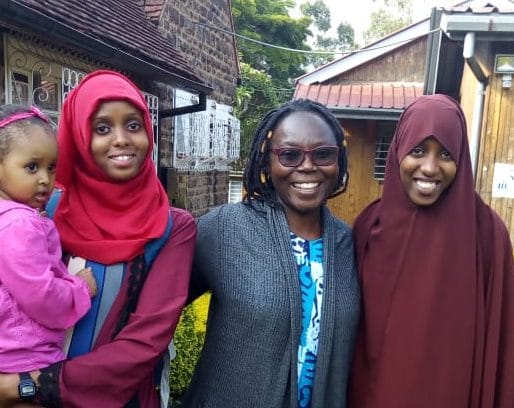
16 Jan 2019 | Non categorizzato
Insights from Congolese journalist Liliane Mugombozi, currently based in the Focolare centre in Nairobi. She works at the Jesuit Refugee Service in the Kenyan capital: “African migrants? The majority are not going to Europe but are moving within the African continent”. “According to the international media, Africa is a continent of mass exodus. But this is not true in reality. Most of these migrants are moving within the continent itself. From 2015 to 2017 nearly 19 million people have moved to destinations within Africa”. Liliane Mugombozi knows what she’s talking about when she describes this under-reported phenomenon. She has been observing it closely through her journalistic lens but also with direct experience over the past two and a half years working at the Jesuit Refugee Service (JRS) in the Kenyan capital, Nairobi. 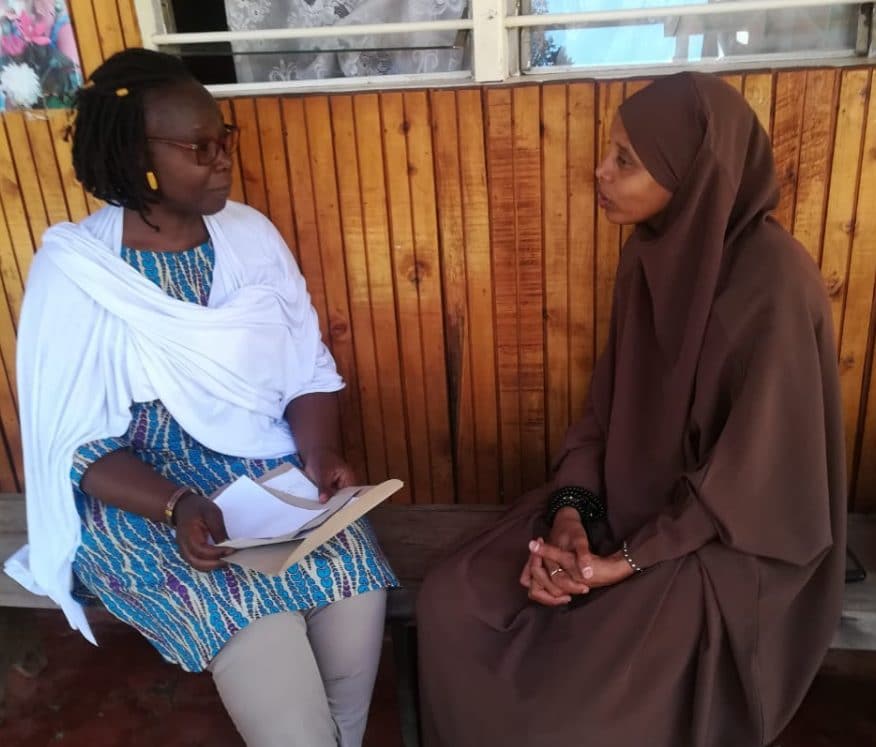 “Since September 2017 more than half a million refugees are living in Kenya. They come mainly from the Great Lakes region, the Horn of Africa and Central Africa, but also from Myanmar, Afganistan etc. Most of them are living in refugee camps at Dadaab and Kakuma; around 64,000 refugees are living within the city of Nairobi itself”. Last December Liliana helped to organize a workshop for 48 young refugees, from many different African countries, including South Sudan and Somalia, to investigate their living conditions as refugees and offer tools to deal with the daily challenges they face, from human rights violations to cultural difficulties. ‘When I look at you – Liliana told them – I don’t see refugees, I see the future of this continent, I see the future of the world. Each one of you has experienced suffering, so who better than you would know how to build strong and fair institutions?’ “From the moment I arrived at JRS in Nairobi, where I work for the secondary school and university students who are able to continue their education because of scholarships and sponsorship, I immediately realised that my service would demand huge flexibility on my part, going way beyond a simply administrative approach. I felt called to share in the suffering behind each one of their stories, to actually meet the person. I understood that the key was to build truly reciprocal relationships with each one.”
“Since September 2017 more than half a million refugees are living in Kenya. They come mainly from the Great Lakes region, the Horn of Africa and Central Africa, but also from Myanmar, Afganistan etc. Most of them are living in refugee camps at Dadaab and Kakuma; around 64,000 refugees are living within the city of Nairobi itself”. Last December Liliana helped to organize a workshop for 48 young refugees, from many different African countries, including South Sudan and Somalia, to investigate their living conditions as refugees and offer tools to deal with the daily challenges they face, from human rights violations to cultural difficulties. ‘When I look at you – Liliana told them – I don’t see refugees, I see the future of this continent, I see the future of the world. Each one of you has experienced suffering, so who better than you would know how to build strong and fair institutions?’ “From the moment I arrived at JRS in Nairobi, where I work for the secondary school and university students who are able to continue their education because of scholarships and sponsorship, I immediately realised that my service would demand huge flexibility on my part, going way beyond a simply administrative approach. I felt called to share in the suffering behind each one of their stories, to actually meet the person. I understood that the key was to build truly reciprocal relationships with each one.”  In the face of so much hope and so much suffering, Liliane was careful not to fall into the trap of confusing the person with their need. “This is a dangerous temptation which would have closed off my heart from a true encounter with these young people, their families, teachers, and with all those around”. The Focolare community in Kenya, especially around Nairobi, has worked in collaboration with the Jesuit Fathers, organizing collections of clothes, food and other essential items, household necessities, books and toys from friends, relations and parishes. Liliana reflects, “We understood firstly we had to overcome our prejudices and get to know the refugees’ own stories in order to create a culture of encounter and of welcome. We are all too aware that we cannot resolve all their problems, but we can become a brother or sister for them. Of course we are only just beginning, but we believe that with Jesus among us, we will find a response to this cry of Jesus on the cross today, in this our own land”.
In the face of so much hope and so much suffering, Liliane was careful not to fall into the trap of confusing the person with their need. “This is a dangerous temptation which would have closed off my heart from a true encounter with these young people, their families, teachers, and with all those around”. The Focolare community in Kenya, especially around Nairobi, has worked in collaboration with the Jesuit Fathers, organizing collections of clothes, food and other essential items, household necessities, books and toys from friends, relations and parishes. Liliana reflects, “We understood firstly we had to overcome our prejudices and get to know the refugees’ own stories in order to create a culture of encounter and of welcome. We are all too aware that we cannot resolve all their problems, but we can become a brother or sister for them. Of course we are only just beginning, but we believe that with Jesus among us, we will find a response to this cry of Jesus on the cross today, in this our own land”.
Stefania Tanesini
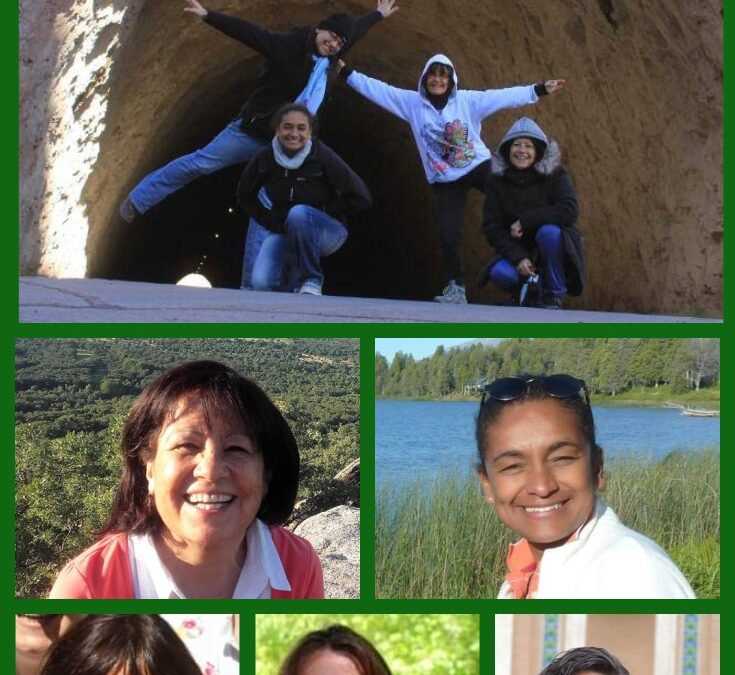
13 Jan 2019 | Non categorizzato
Natives and migrants live side by side in this vast territory characterised by its cold and dry climate. This is Patagonia, in the extreme south of Argentina, where there are various communities of the Movement and where there has been a focolare centre since 2010. 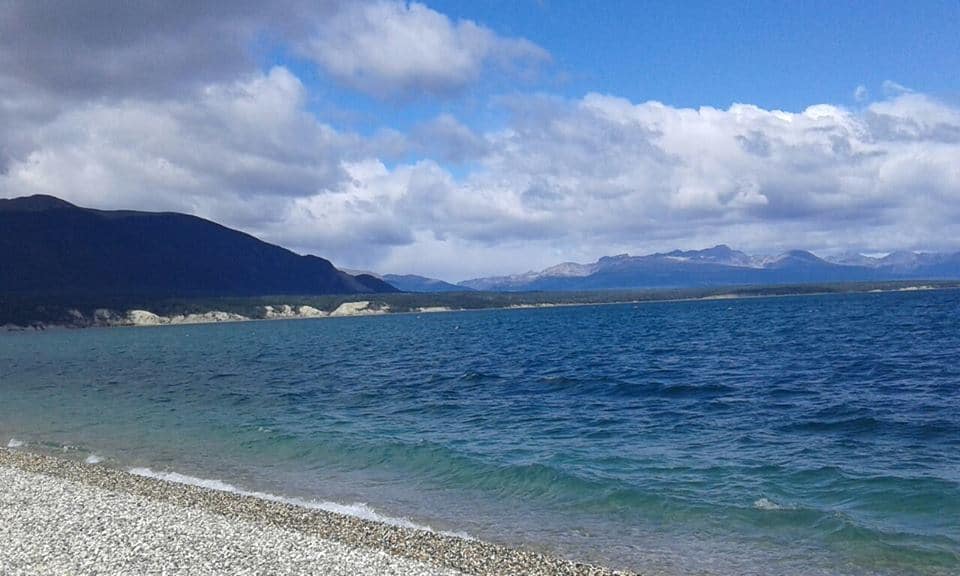 It’s an enchanting landscape with rivers, lakes, the sea, mountains and glaciers. It’s populated by many species of animals: whales, penguins, mara (or hares) of Patagonia, guanaco (similar to llamas and common in South America) and Darwin’s rhea, a large flightless bird endemic to this region and known locally as the “choique”. In this scenario with its cold and dry climate, the southernmost focolare centre in the world opened in the city of Trelew in 2010. The territory of Trelew, inhabited by the native Mapuche-tehuelche peoples, was named after the arrival of Welsh immigrants in 1865. The city is almost a natural “gateway” to the vast territory of Patagonia (1,768,165 km²), which was already home to lively groups of members of the Movement.
It’s an enchanting landscape with rivers, lakes, the sea, mountains and glaciers. It’s populated by many species of animals: whales, penguins, mara (or hares) of Patagonia, guanaco (similar to llamas and common in South America) and Darwin’s rhea, a large flightless bird endemic to this region and known locally as the “choique”. In this scenario with its cold and dry climate, the southernmost focolare centre in the world opened in the city of Trelew in 2010. The territory of Trelew, inhabited by the native Mapuche-tehuelche peoples, was named after the arrival of Welsh immigrants in 1865. The city is almost a natural “gateway” to the vast territory of Patagonia (1,768,165 km²), which was already home to lively groups of members of the Movement. 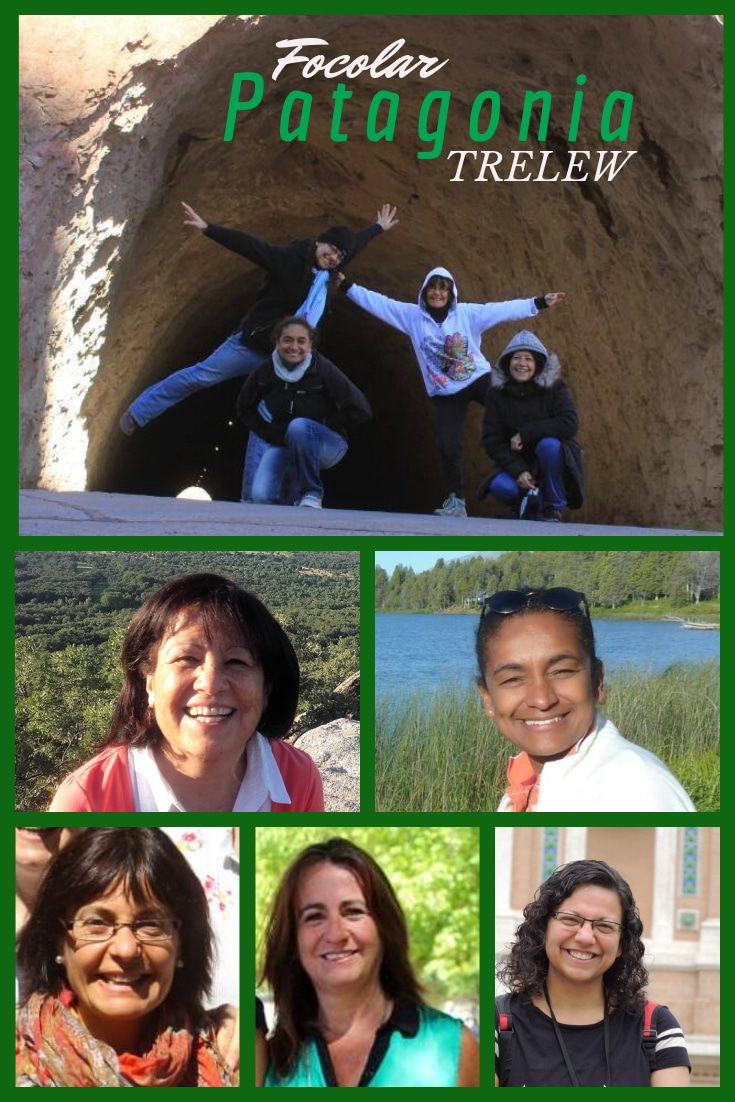 Today the focolare accompanies the communities of Neuquen, Rio Negro, Chubut, Santa Cruz and Tierra del Fuego. There are five focolarinas in the focolare – Angela Correia of Brazil, Emma Murillo of Mexico and three from Argentina: Silvia Deramo, Mónica Reina and Maria Ángel. “I am very happy to be here where Don Bosco sent Salesian missionaries, after he saw a land that he recognized as Patagonia a dream,” explains Mónica. Emma introduces herself: “For me to meet the Focolare Movement was to experience the immense love of God. The more I knew God, the more I wanted to love him, to follow Him to bring Love to the ends of the earth. And in fact … that’s where I am – right at the end of the world!! How do we live here? We try to put evangelical love into practice: at work, on the street, in the parish and in the communities of the Movement scattered throughout Patagonia.” Angela, a professor of Portuguese language at the state university, continues. “ I have experienced that trying to convey the values in which I believe, not through words, but through the way I live, has created relationships of friendship and trust with colleagues and students. I have seen many individualistic attitudes change.” Assisting the local Church in pastoral activities, engaging in the dialogue between the Churches and with people of other convictions, as well as assisting in activities to support needy families are among the activities of the Movement in this culturally rich environment and very varied society. The population is made up of people from different countries and cultures. Many move from neighbouring regions and countries in search of work and a better future. This enriches the population, but it is also a challenge, because many of these people stay only for a period of their lives, and then they return to their places of origin.
Today the focolare accompanies the communities of Neuquen, Rio Negro, Chubut, Santa Cruz and Tierra del Fuego. There are five focolarinas in the focolare – Angela Correia of Brazil, Emma Murillo of Mexico and three from Argentina: Silvia Deramo, Mónica Reina and Maria Ángel. “I am very happy to be here where Don Bosco sent Salesian missionaries, after he saw a land that he recognized as Patagonia a dream,” explains Mónica. Emma introduces herself: “For me to meet the Focolare Movement was to experience the immense love of God. The more I knew God, the more I wanted to love him, to follow Him to bring Love to the ends of the earth. And in fact … that’s where I am – right at the end of the world!! How do we live here? We try to put evangelical love into practice: at work, on the street, in the parish and in the communities of the Movement scattered throughout Patagonia.” Angela, a professor of Portuguese language at the state university, continues. “ I have experienced that trying to convey the values in which I believe, not through words, but through the way I live, has created relationships of friendship and trust with colleagues and students. I have seen many individualistic attitudes change.” Assisting the local Church in pastoral activities, engaging in the dialogue between the Churches and with people of other convictions, as well as assisting in activities to support needy families are among the activities of the Movement in this culturally rich environment and very varied society. The population is made up of people from different countries and cultures. Many move from neighbouring regions and countries in search of work and a better future. This enriches the population, but it is also a challenge, because many of these people stay only for a period of their lives, and then they return to their places of origin.
8 Jan 2019 | Non categorizzato
400 administrators, citizens, economists, experts and professionals from all over the world will meet at Castel Gandolfo, Rome, from 17 to 20 January 2019 for four days of discussion and study on urban management, networking and models of sustainability and living together. Among the experts and protagonists that will participate in this conference and share their thought and experience in a “post-democratic” era, one finds Emilce Cuda, a politologist from Argentina well-versed in Pope Francis’ thought, the Hon. Sunggon Kim (김성곤), Buddhist, former General Secretary of the Korean National Assembly, Ximena Samper, an architect from Colombia and the Hon. Ghassan Mukheiber from Lebanon, Chairman of the Arab Region Parliamentarians Against Corruption. The Mayor of Katowice, Poland, where the COP 24 has just taken place, Angel Miret, coordinator of the operational committee for refugees in Catalonia and Izzedin Elzir, the President of the Islamic Community in Florence and Tuscany are also expected to participate. Urban management has always been a complex task, but today it is even more so. It needs to answer to a continuously changing society, that faces local and global problems and is conditioned by an uncontrollable technological development that causes the risk of great economical chasms and unprecedented areas of new poverty. Decisions need to be taken today, but these determine the future. Cities have a very strong strategical, political and cultural importance; they are “home” for more than half the world’s population (source UN), and this is not a free choice but it is often linked to lack of food and work. In this era dominated by sovereignities, cities are becoming real social hubs with an endless number of connections: civil, political, anthropological, economical, communicative. They express a new identity model, marked not by exasperating localism or nationalism, but by participation and sharing in the same common affair, as we all belong to the same human family, even before we participate in it. Co-Governance is being organized by “New Humanity Movement”, “Movement for Politics & Policy for Unity” and “Associazione Città per la Fraternità”. For further information: www.co-governance.org
Stefania Tanesini


 “Since September 2017 more than half a million refugees are living in Kenya. They come mainly from the Great Lakes region, the Horn of Africa and Central Africa, but also from Myanmar, Afganistan etc. Most of them are living in refugee camps at Dadaab and Kakuma; around 64,000 refugees are living within the city of Nairobi itself”. Last December Liliana helped to organize a workshop for 48 young refugees, from many different African countries, including South Sudan and Somalia, to investigate their living conditions as refugees and offer tools to deal with the daily challenges they face, from human rights violations to cultural difficulties. ‘When I look at you – Liliana told them – I don’t see refugees, I see the future of this continent, I see the future of the world. Each one of you has experienced suffering, so who better than you would know how to build strong and fair institutions?’ “From the moment I arrived at JRS in Nairobi, where I work for the secondary school and university students who are able to continue their education because of scholarships and sponsorship, I immediately realised that my service would demand huge flexibility on my part, going way beyond a simply administrative approach. I felt called to share in the suffering behind each one of their stories, to actually meet the person. I understood that the key was to build truly reciprocal relationships with each one.”
“Since September 2017 more than half a million refugees are living in Kenya. They come mainly from the Great Lakes region, the Horn of Africa and Central Africa, but also from Myanmar, Afganistan etc. Most of them are living in refugee camps at Dadaab and Kakuma; around 64,000 refugees are living within the city of Nairobi itself”. Last December Liliana helped to organize a workshop for 48 young refugees, from many different African countries, including South Sudan and Somalia, to investigate their living conditions as refugees and offer tools to deal with the daily challenges they face, from human rights violations to cultural difficulties. ‘When I look at you – Liliana told them – I don’t see refugees, I see the future of this continent, I see the future of the world. Each one of you has experienced suffering, so who better than you would know how to build strong and fair institutions?’ “From the moment I arrived at JRS in Nairobi, where I work for the secondary school and university students who are able to continue their education because of scholarships and sponsorship, I immediately realised that my service would demand huge flexibility on my part, going way beyond a simply administrative approach. I felt called to share in the suffering behind each one of their stories, to actually meet the person. I understood that the key was to build truly reciprocal relationships with each one.” 
 It’s an enchanting landscape with rivers, lakes, the sea, mountains and glaciers. It’s populated by many species of animals: whales, penguins, mara (or hares) of Patagonia, guanaco (similar to llamas and common in South America) and Darwin’s rhea, a large flightless bird endemic to this region and known locally as the “choique”. In this scenario with its cold and dry climate, the southernmost focolare centre in the world opened in the city of Trelew in 2010. The territory of Trelew, inhabited by the native Mapuche-tehuelche peoples, was named after the arrival of Welsh immigrants in 1865. The city is almost a natural “gateway” to the vast territory of Patagonia (1,768,165 km²), which was already home to lively groups of members of the Movement.
It’s an enchanting landscape with rivers, lakes, the sea, mountains and glaciers. It’s populated by many species of animals: whales, penguins, mara (or hares) of Patagonia, guanaco (similar to llamas and common in South America) and Darwin’s rhea, a large flightless bird endemic to this region and known locally as the “choique”. In this scenario with its cold and dry climate, the southernmost focolare centre in the world opened in the city of Trelew in 2010. The territory of Trelew, inhabited by the native Mapuche-tehuelche peoples, was named after the arrival of Welsh immigrants in 1865. The city is almost a natural “gateway” to the vast territory of Patagonia (1,768,165 km²), which was already home to lively groups of members of the Movement.  Today the focolare accompanies the communities of Neuquen, Rio Negro, Chubut, Santa Cruz and Tierra del Fuego. There are five focolarinas in the focolare – Angela Correia of Brazil, Emma Murillo of Mexico and three from Argentina: Silvia Deramo, Mónica Reina and Maria Ángel. “I am very happy to be here where Don Bosco sent Salesian missionaries, after he saw a land that he recognized as Patagonia a dream,” explains Mónica. Emma introduces herself: “For me to meet the Focolare Movement was to experience the immense love of God. The more I knew God, the more I wanted to love him, to follow Him to bring Love to the ends of the earth. And in fact … that’s where I am – right at the end of the world!! How do we live here? We try to put evangelical love into practice: at work, on the street, in the parish and in the communities of the Movement scattered throughout Patagonia.” Angela, a professor of Portuguese language at the state university, continues. “ I have experienced that trying to convey the values in which I believe, not through words, but through the way I live, has created relationships of friendship and trust with colleagues and students. I have seen many individualistic attitudes change.” Assisting the local Church in pastoral activities, engaging in the dialogue between the Churches and with people of other convictions, as well as assisting in activities to support needy families are among the activities of the Movement in this culturally rich environment and very varied society. The population is made up of people from different countries and cultures. Many move from neighbouring regions and countries in search of work and a better future. This enriches the population, but it is also a challenge, because many of these people stay only for a period of their lives, and then they return to their places of origin.
Today the focolare accompanies the communities of Neuquen, Rio Negro, Chubut, Santa Cruz and Tierra del Fuego. There are five focolarinas in the focolare – Angela Correia of Brazil, Emma Murillo of Mexico and three from Argentina: Silvia Deramo, Mónica Reina and Maria Ángel. “I am very happy to be here where Don Bosco sent Salesian missionaries, after he saw a land that he recognized as Patagonia a dream,” explains Mónica. Emma introduces herself: “For me to meet the Focolare Movement was to experience the immense love of God. The more I knew God, the more I wanted to love him, to follow Him to bring Love to the ends of the earth. And in fact … that’s where I am – right at the end of the world!! How do we live here? We try to put evangelical love into practice: at work, on the street, in the parish and in the communities of the Movement scattered throughout Patagonia.” Angela, a professor of Portuguese language at the state university, continues. “ I have experienced that trying to convey the values in which I believe, not through words, but through the way I live, has created relationships of friendship and trust with colleagues and students. I have seen many individualistic attitudes change.” Assisting the local Church in pastoral activities, engaging in the dialogue between the Churches and with people of other convictions, as well as assisting in activities to support needy families are among the activities of the Movement in this culturally rich environment and very varied society. The population is made up of people from different countries and cultures. Many move from neighbouring regions and countries in search of work and a better future. This enriches the population, but it is also a challenge, because many of these people stay only for a period of their lives, and then they return to their places of origin.